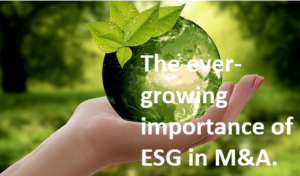The ever-growing importance of ESG in M&A

In the world of M&A, both buyers and sellers are placing greater emphasis on Environmental, Social, and Governance credentials.
As a result of this boards and management are paying significantly more attention to ESG considerations in M&A transactions. As each company is developing its own ESG strategy and culture in which ESG is a core component, management and boards are very conscious of whether a target’s ESG strategy and culture will be compatible with their own. Also, stakeholders, including large institutions, are requiring greater transparency and accountability from companies on ESG factors, and this unprecedented level of engagement is creating both risk and opportunities that are financially material to companies. Mitigation of risks while maximising ESG synergies have now become important factors in M&A processes.
ESG criteria are reporting practices used by businesses and can be seen as a set of standards for a company’s operations that socially conscious investors use to screen potential investments. Companies poised to sell can leverage ESG metrics to determine the value of their business. Similarly, private equity firms, multinational companies, and other buyers searching for the right acquisition target can use these same metrics to evaluate Targets and reduce reporting burden. As ESG continues to gain importance in M&A transactions, both Buyers and Sellers realize that ESG credentials are no longer sources of risk mitigation but rather of value creation.
Linking corporate ESG strategy to M&A Success in this arena begins by linking overarching corporate ESG strategy to M&A strategy.
We have seen that there is an increasing body of research which shows a positive link between ESG performance and financial performance or value creation.
The proper assessment of known, potential, and contingent liabilities allows Sellers to identify and mitigate risks prior to entering into a transaction. Sellers can be more confident that their valuation will not be reduced due to these risks. In the M&A industry, a company’s failure to understand and properly address key ESG factors in its business can be seen as a significant risk to the company’s long-term value. Buyers may choose to reduce the price of the transaction upon discovering ESG liabilities.
On the buy-side, if they analyse ESG metrics, they will have a better assessment of their Target’s value. Companies are increasingly tracking ESG measures and risks, and reporting on these findings. Disclosure has increased tremendously in the last years. Such reports can flag environmental issues or other legal risks, which might not otherwise appear in a diligence request list. An example would be the ability of a Target to adapt in an environmental crisis. The M&A industry will continue to see ESG risk as a prominent transaction factor with the increasing damage from climate change while on the other hand also being able to see the ESG opportunities that the Target possesses, such as resource efficiency and cost savings, access to new markets, and resilience in the supply-chain.
There are initiatives that have also come out with their own recommended guidelines for best ESG practices. These existing ESG frameworks can be useful baseline measurement tools for Buyers.
While ESG has traditionally been overlooked in the M&A world, Dealmakers are realizing its inevitable rise in importance. Sellers who engage in ESG diligence improve their business valuation and competitive market pricing, while Buyers are able to better evaluate their Targets and reduce reporting. Both Buyers and Sellers benefit from creating value from ESG metrics rather than perceiving ESG as solely risk based.